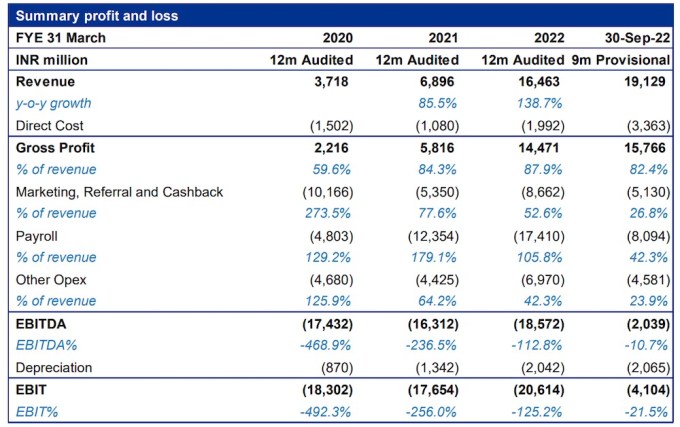PhonePe clocked a revenue of $234.3 million in the first nine months of 2022, the most valuable Indian fintech startup has disclosed in a filing.
The nine-month financials marks a jump from the $201.6 million revenue that the Bengaluru-headquartered generated in the 12-month financial year period ending in March last year.
PhonePe, which is valued at $12 billion, has projected a revenue of $325 million for the calendar year 2022 and $504 million for 2023, according to a valuation report prepared by the auditing firm KPMG and filed by PhonePe. The auditing firm’s estimates relied on information provided by the PhonePe management, the document said.
The startup, backed by Walmart, doesn’t expect to turn EBIDTA positive, a key profitability metric, until the calendar year 2025, KMPG wrote in its valuation report. PhonePe’s financials and metrics from the valuation report have not been previously reported.

Image credits: PhonePe regulatory filing
At a $12 billion valuation, PhonePe is India’s most valuable fintech startup. The startup competes with Google Pay and Paytm. Paytm, which expects to reach $1 billion revenue by March this year, is currently valued at $4.1 billion.
PhonePe, to be sure, is the clear leader in the mobile payments market on UPI, a network built by a coalition of retail banks in India. UPI has become the most popular way Indians transact online, and processes over 7 billion transactions a month. Seven-year-old PhonePe commands about 40% of all these transactions.
A concern for PhonePe’s growth was Indian regulators enforcing a market cap check on each player, but the deadline for the new guidelines was extended last month and now won’t come into effect until 2025, giving PhonePe another two years of fast-growth.
Walmart-backed PhonePe’s nine-month 2022 revenue surged to $234 million by Manish Singh originally published on TechCrunch
from TechCrunch https://ift.tt/aznMQ2K

Comments
Post a Comment